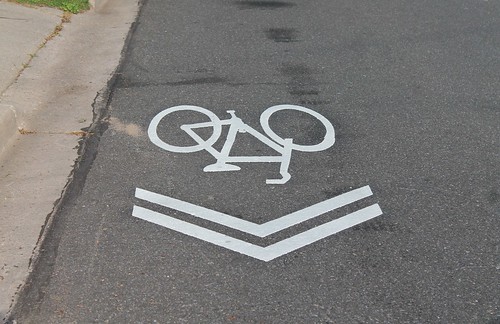 Wise men say that we won't face more adversity in life than we can handle. Wise men say that each moment of our lives prepares us to live life more fully today and tomorrow.
Wise men say that we won't face more adversity in life than we can handle. Wise men say that each moment of our lives prepares us to live life more fully today and tomorrow.
I can say that over the past few weeks, I have been a little hard-pressed to feel or truly appreciate the wisdom of the wise.
Loss. It is something that invariably and eventually appears in our lives. We will all experience loss in some way or another: a friend, a family member, a love. Loss makes an appearance in our world and can challenge us to the core of our being – but there is much to be learned.
![No [Storage] Zone](http://static.flickr.com/3188/2736560040_df006a65fe.jpg) The zone. It's a magical place to be. The zone is a moment in time when everything is clicking and flowing.
The zone. It's a magical place to be. The zone is a moment in time when everything is clicking and flowing.
We often think of it in terms of sports. With March Madness upon us, I always think of the point guard who is shooting the lights out. He's in the zone. He can't and doesn't miss. Shots are flowing. There is a rhythm, a tempo, a feeling of insurmountable confidence.
We find ourselves in the zone in all aspects of life at one time or another. It's a place that we all seek, be it in our work lives, our athletic endeavors, or our creative pursuits. But we also find ourselves struggling at times to find it.
 The 2014 Sochi Winter Olympics are now officially a part of Olympic history. We've witnessed the highs and lows and the tales of victory and defeat with unprecedented clarity through countless cable TV stations and social media outlets.
The 2014 Sochi Winter Olympics are now officially a part of Olympic history. We've witnessed the highs and lows and the tales of victory and defeat with unprecedented clarity through countless cable TV stations and social media outlets.
This year, I didn't get mesmerized by curling (Note: that phrase might actually be an oxymoron, but I digress). But having been born and raised in Canada, I probably don't have to explain my desire to watch hockey.
The beauty of the Olympics every couple of years is that we are exposed to special performances from what we think are special people. However, one quick look around you and you might just find that there is an Olympian in all of us.
 It occurs in countless clinics and facilities around the world every day. It may, in fact, be the curse of modern medicine as we know it.
It occurs in countless clinics and facilities around the world every day. It may, in fact, be the curse of modern medicine as we know it.
The logical fallacy.
It rears its ugly head in any number of ways. Take, for example, the premise underlying the "logical" (yet arbitrary) concept of asymmetry and muscle imbalance. In our world today, there are countless examples of normal anatomic variability being "treated" as a problem when in fact they are, as I mentioned, normal for that individual.
Forget about what you think you witness in the clinic for a moment. Forget about what you were taught about asymmetry and imbalance. Let's step back and take a look.
 Let me start this post by saying that I am a cyclist. But don't think for a moment that I am just going to rant about crappy drivers. It's not that simple for me. I am a motorist as well.
Let me start this post by saying that I am a cyclist. But don't think for a moment that I am just going to rant about crappy drivers. It's not that simple for me. I am a motorist as well.
I live on a street that has two northbound lanes and two southbound lanes divided by a median. There is also a very wide, well-marked bike lane northbound and southbound. It is a popular thoroughfare for cyclists riding to and from Austin and San Marcos.
As a motorist, I always try to be aware of cyclists. I have heard too many horror stories over the years, and I do my part to give them the space necessary to ride safely. With that said, as a cyclist I try to be cognizant of a motorist's challenge in seeing us and understanding how we function on the roads.
 I have had many years of guiding athletes through the maze that is injury recovery. I've witnessed not only the physical effects of injury and illness, but also the struggles faced by the athlete mentally and emotionally as they work their way through it.
I have had many years of guiding athletes through the maze that is injury recovery. I've witnessed not only the physical effects of injury and illness, but also the struggles faced by the athlete mentally and emotionally as they work their way through it.
I've mentored them through the process, offered insights, and advised them regarding the attainment of life balance throughout this challenging time in their lives. I have always seen injury not as a failure, but as an opportunity - to learn from the experience and to put good strategies in place for the future. Through it all, I have gained a deeper understanding of the psyche of the athlete and the fine balance between all the factors required to make it all work.
That is, until I became the athlete in question. It is amazing how when the tables are turned, your head spins with the reality.
 It is with great pride that I announce that Smart Sport International (SSI) turns 10 years old today. Oh, how the time goes by quickly! This anniversary is marked by a new location (at H.E.A.T. Bootcamp in Austin) and upcoming open house on February 7. More details on that later.
It is with great pride that I announce that Smart Sport International (SSI) turns 10 years old today. Oh, how the time goes by quickly! This anniversary is marked by a new location (at H.E.A.T. Bootcamp in Austin) and upcoming open house on February 7. More details on that later.
The roots of SSI go all the way back to 1992. By 2004, a vision had evolved to create a seamless integration of sport science solutions for training, rehab, and life. Another 10 years later, and SSI is moving into decade number two and has become the home of competent self care. Be it injury recovery or endurance sport performance, SSI has always focused on sports science-based and athlete-centered approaches to both injury prevention and injury recovery.
 "Running Injuries: Etiology And Recovery- Based Treatment" (co-author Bridget Clark, PT) appears in the third edition and fourth editions of "Clinical Orthopaedic Rehabilitation: A Team Approach" by Charles Giangarra, MD and Robert C. Manske, PT.
"Running Injuries: Etiology And Recovery- Based Treatment" (co-author Bridget Clark, PT) appears in the third edition and fourth editions of "Clinical Orthopaedic Rehabilitation: A Team Approach" by Charles Giangarra, MD and Robert C. Manske, PT.
 Allan Besselink, PT, DPT, Ph.D., Dip.MDT has a unique voice in the world of sports, education, and health care. Read more about Allan here.
Allan Besselink, PT, DPT, Ph.D., Dip.MDT has a unique voice in the world of sports, education, and health care. Read more about Allan here.
 Top 5 finalist in three categories: "Best Overall Blog", "Best PT Blog" and "Best Advocacy Blog".
Top 5 finalist in three categories: "Best Overall Blog", "Best PT Blog" and "Best Advocacy Blog".